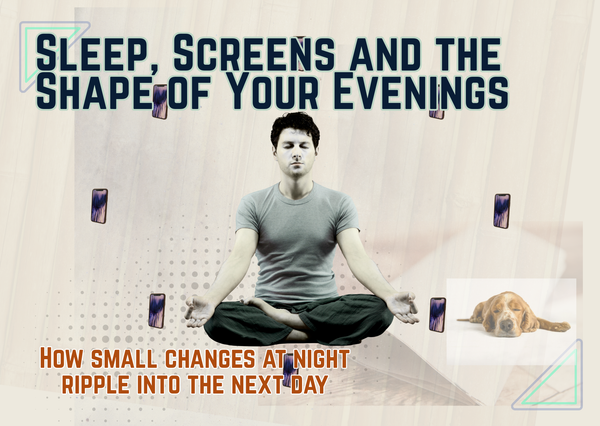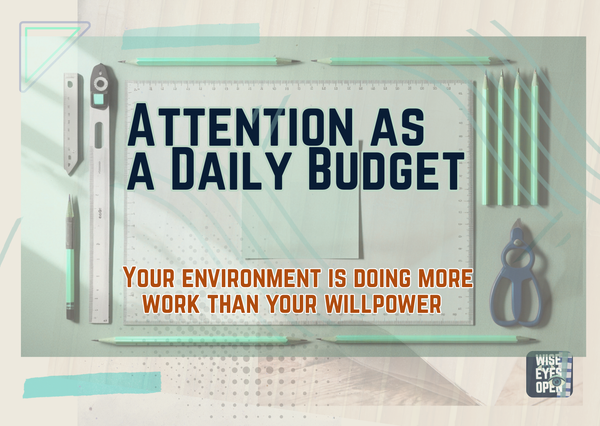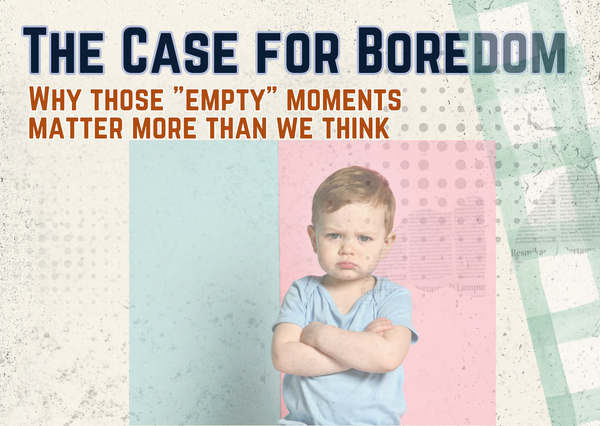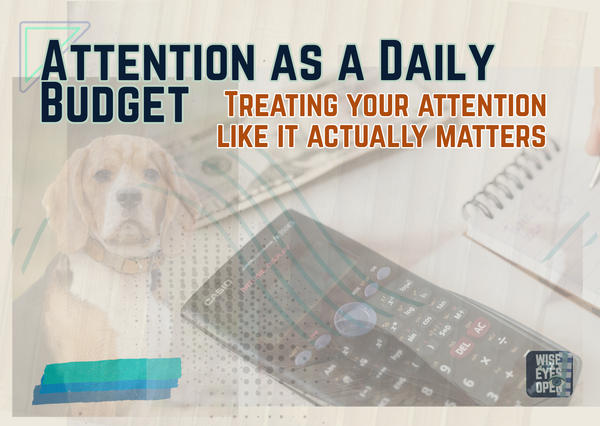The Slow News Movement: Why Consuming Less Information Can Make You Better Informed"

Do you ever catch yourself mindlessly scrolling through your phone, jumping from one breaking news alert to the next, only to feel oddly empty afterward? One morning, after spending an hour swiping through headlines before getting out of bed, I realized I couldn't recall a single useful thing I'd learned. My mind was buzzing with fragments of stories, yet none of it stuck. That moment made me question the bite-sized, overstimulated media diet I'd grown accustomed to.
In a world drowning in information, could consuming less actually help us understand more?
We're Drowning in Digital Noise
The numbers are staggering. U.S. adults now spend nearly 8 hours a day consuming digital media. That's more time than most people sleep. That's not screentime - that is screentime or phone-use, it's consumption - pure conumption! Major news sites pump out content at a breathless pace. The Mail Online publishes roughly 1,500 articles per day. Globally, close to a million news pieces get published daily, including nearly 60,000 articles generated by AI bots. Add YouTube's 500 hours of video uploaded every minute and endless social media posts, and our collective attention is stretched impossibly thin.

The psychological toll is real. Constant information bombardment elevates stress and anxiety levels. Studies show that endless news exposure creates a sense of helplessness and exhaustion. Our brains have finite processing power. When we try to drink from the firehose of headlines and notifications, we process information shallowly. We skim and react but rarely understand.
Have you ever felt like you were keeping up with all the latest news, yet when someone asks you for a deeper insight, your mind goes blank? It's not your fault. As Nobel Prize-winning economist Herbert Simon observed decades ago, "a wealth of information creates a poverty of attention." Important nuances drown in noisy updates. Our decisions get formed on headline impressions and knee-jerk reactions rather than deep understanding.
Information overload also wreaks havoc on sleep, concentration, and self-esteem. It's like having too many browser tabs open ( guilty!! ). Nothing gets full focus, and everything slows down.
The Slow News Alternative
Think about eating when you're extremely hungry. You could wolf down fast food in seconds and still feel unsatisfied, or take time savoring a well-cooked, nourishing meal. Information works the same way. "Fast news" is like fast food: quick, sensational, initially gratifying, but ultimately empty. "Slow news" invites us to savor information deliberately, prioritizing quality over quantity and depth over speed.
When I first heard about slow news, I was skeptical. Wouldn't consuming less mean missing important things? But slowing down doesn't mean ignorance. It means being intentional about what you read and giving yourself time to process it.
I decided to experiment. Instead of checking news apps 20 times daily, I started reading a weekly news magazine each Sunday morning with coffee, phone out of reach. I followed a couple of in-depth journalism sites that prioritized Times Online, The Economist & The Athletic. Quality over over clickbait. The difference was massive. One well-researched article taught me more than dozens of scattered news snippets. That knot of anxiety in my chest began to loosen and it just feels so much more "real".
Science backs this up. Our brains encode and retain information more effectively through spaced, focused sessions rather than continuous blur. Psychologists call this the spacing effect. Cramming your brain with facts is far less effective than revisiting information periodically and reflectively. Reading a detailed report today and thinking about it over the coming days lodges it in memory better than gorging on dozens of breaking news tweets every hour.
The Power of Selective Attention
Herbert Simon also introduced the concept of "bounded rationality." We have cognitive limits. There's only so much data we can absorb before hitting overload. Good decision-making isn't about consuming all available information (impossible anyway). It's about being selective and focusing on what truly matters. When everything is priority, nothing is priority.
The Slow News approach encourages pruning information sources and habits. Choose a couple of reliable news sources and ignore the noise. Schedule one or two defined times daily to check news instead of living glued to updates. Resist the urge to react to every alert in real-time.
An editor at a slow journalism magazine compared fast news updates to "empty carbs" while slow news provides "nutritious" information with context, accuracy, and insight. When news becomes a sprint, journalists admit that fundamentals like fact-checking and providing background often fall by the wayside.
I experienced this firsthand during a major international story. Instead of following breaking developments on social media with piecemeal updates and speculation, I waited for the next day's newspaper and a well-regarded podcast's analysis. Far from feeling out of the loop, I felt more informed. The next-day accounts had hindsight and thorough reporting. They connected dots and separated facts from rumors. One long piece and one discussion gave me actual understanding rather than anxious refreshing without context.
Reclaiming Control
Adopting slower media consumption brings peace and control back to your day. Instead of news controlling you, you regain the driver's seat. It is such a positive change. Initially I had FOMO, but soon realized I wasn't missing anything critical. If something truly big happened, I'd hear about it anyway and could seek details on my own terms. This simple change cut ambient anxiety significantly.
The Slow News philosophy values rich understanding of fewer things over shallow grasp of many. You might not know every headline, but the stories you follow, you truly get. Investing time in a long investigative piece on climate solutions or a historical deep-dive into conflict background helps you see the big picture that fast news rarely provides.
It just feels right to be picking up a print magazine, listening to decent radio or audio or just not consuming media at all for a while. These feel almost radical in our age of constant digital stimulation. They remind us that information isn't meant to be a frantic race, but a process of continuous learning.
The Payoff
Embracing slow media consumption reduces stress, improves retention, and enables better decision-making without overwhelming anxiety. It transforms something that was a source of stress into an enriching part of life. If more people choose quality over quantity in their media diets, we might foster a culture that values understanding over knee-jerk reactions.
Switching to slower news doesn't require drastic change, just mindful choices. Turn down the noise. Seek substance over speed. Give yourself permission to not know everything instantly. I feel more informed now than when I was devouring twice as much content.
The old cliché was right: sometimes less really is more. Next time you feel the urge to frantically refresh for updates, take a breath, step back, and reach for a slower source of news. Or no news at all. Your brain will thank you, and your understanding of the world might just deepen in the calm that follows.




